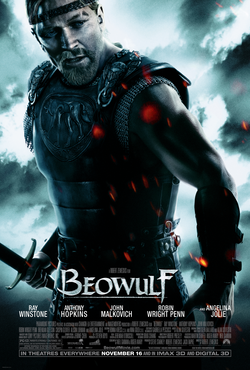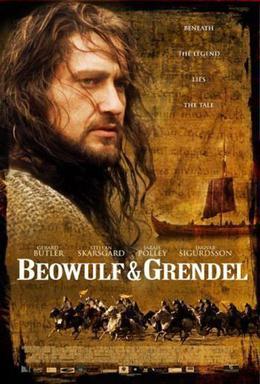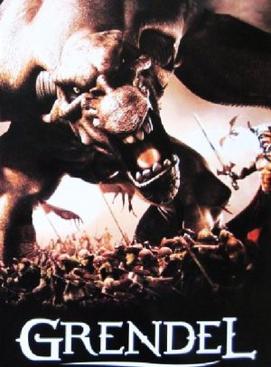Related Research Articles

Beowulf is an Old English epic poem in the tradition of Germanic heroic legend consisting of 3,182 alliterative lines. It is one of the most important and most often translated works of Old English literature. The date of composition is a matter of contention among scholars; the only certain dating is for the manuscript, which was produced between 975 and 1025 AD. Scholars call the anonymous author the "Beowulf poet". The story is set in pagan Scandinavia in the 5th and 6th centuries. Beowulf, a hero of the Geats, comes to the aid of Hrothgar, the king of the Danes, whose mead hall Heorot has been under attack by the monster Grendel for twelve years. After Beowulf slays him, Grendel's mother takes revenge and is in turn defeated. Victorious, Beowulf goes home to Geatland and becomes king of the Geats. Fifty years later, Beowulf defeats a dragon, but is mortally wounded in the battle. After his death, his attendants cremate his body and erect a barrow on a headland in his memory.

Grendel is a character in the Anglo-Saxon epic poem Beowulf. He is one of the poem's three antagonists, all aligned in opposition against the protagonist Beowulf. He is referred to as both an eoten and a þyrs, types of beings from wider Germanic mythology. He is also described as a descendant of the Biblical Cain and "a creature of darkness, exiled from happiness and accursed of God, the destroyer and devourer of our human kind." He is usually depicted as a monster or a giant, although his status as a monster, giant, or other form of supernatural being is not clearly described in the poem and thus remains the subject of scholarly debate. The character of Grendel and his role in the story of Beowulf have been subject to numerous reinterpretations and re-imaginings. Grendel is feared by all in Heorot but Beowulf, who kills both him and his mother.

Beowulf is a legendary Geatish hero in the eponymous epic poem, one of the oldest surviving pieces of English literature.
Breca was a Bronding who, according to the Anglo-Saxon poem Beowulf, was Beowulf's childhood friend. Breca defeated Beowulf in what, by consensus, is described as a swimming match.

"Beowulf: The Monsters and the Critics" was a 1936 lecture given by J. R. R. Tolkien on literary criticism on the Old English heroic epic poem Beowulf. It was first published as a paper in the Proceedings of the British Academy, and has since been reprinted in many collections.

Beowulf is a 2007 American animated fantasy action film produced and directed by Robert Zemeckis, written by Neil Gaiman and Roger Avary, based on the Old English epic poem Beowulf, and featuring the voices of Ray Winstone, Anthony Hopkins, Robin Wright, Brendan Gleeson, John Malkovich, Crispin Glover, Alison Lohman, and Angelina Jolie. The film depicts the rise and fall of the warrior Beowulf after he travels to Denmark to kill a monster. It was produced by Shangri-La Entertainment and Zemeckis's ImageMovers and features characters animated using motion-capture animation, which was previously used in The Polar Express (2004) and Monster House (2006).

Grendel's mother is one of three antagonists in the anonymous Old English poem Beowulf, the other two being Grendel and the dragon. Each antagonist reflects different negative aspects of both the hero Beowulf and the heroic society in which the poem is set. Grendel's mother is introduced in lines 1258b to 1259a as: "Grendles modor/ides, aglæcwif".

In the Old English epic poem Beowulf, Unferth or Hunferth is a thegn of the Danish lord Hrothgar. He appears five times in the poem — four times by the name 'Hunferð' and once by the appellation "the son of Eclafes". The name Unferth does not appear in any Old English manuscript outside of the Nowell Codex, which contains Beowulf, and the meaning of the name is disputed. Several scholarly theories about Unferth have been proposed.

Beowulf & Grendel is a 2005 Canadian-Icelandic fantasy adventure film directed by Sturla Gunnarsson, loosely based on the Anglo-Saxon epic poem Beowulf. It stars Gerard Butler as Beowulf, Stellan Skarsgård as Hrothgar, Ingvar Eggert Sigurðsson as Grendel and Sarah Polley as the witch Selma. The screenplay was written by Andrew Rai Berzins. The soundtrack was composed by Hilmar Örn Hilmarsson.

Grendel is a 1971 novel by the American author John Gardner. It is a retelling of part of the Old English poem Beowulf from the perspective of the antagonist, Grendel. In the novel, Grendel is portrayed as an antihero. The novel deals with finding meaning in the world, the power of literature and myth, and the nature of good and evil.

Grendel is a 2007 American action-fantasy television film directed by Nick Lyon and very loosely based on the Old English epic poem Beowulf. The television film was produced by the Sci Fi channel as an original movie for broadcasting on the Sci Fi cable television network, and began airing on January 13, 2007. In 2010 it was released on DVD from the sister company by Universal Pictures.

The final act of the Anglo-Saxon poem Beowulf includes Beowulf's fight with a dragon, the third monster he encounters in the epic. On his return from Heorot, where he killed Grendel and Grendel's mother, Beowulf becomes king of the Geats and rules wisely for fifty years until a slave awakens and angers a dragon by stealing a jewelled cup from its lair. When the angry dragon mercilessly burns the Geats' homes and lands, Beowulf decides to fight and kill the monster personally. He and his thanes climb to the dragon's lair where, upon seeing the beast, the thanes flee in terror, leaving only Wiglaf to battle at Beowulf's side. When the dragon wounds Beowulf fatally, Wiglaf attacks it with his sword, and Beowulf kills it with his dagger.
A bēot is Old English for a ritualized boast, vow, threat, or promise. The principle of a bēot is to proclaim one's acceptance of a seemingly impossible challenge in order to gain tremendous glory for actually accomplishing it.
The "Finnesburg Fragment" is a portion of an Old English heroic poem in alliterative verse about a fight in which Hnæf and his 60 retainers are besieged at "Finn's fort" and attempt to hold off their attackers. The surviving text is tantalisingly brief and allusive, but comparison with other references in Old English poetry, notably Beowulf, suggests that it deals with a conflict between Danes and Frisians in Migration-Age Frisia.

Beowulf: A Translation and Commentary is a prose translation of the early medieval epic poem Beowulf from Old English to modern English. Translated by J. R. R. Tolkien from 1920 to 1926, it was edited by Tolkien's son Christopher and published posthumously in May 2014 by HarperCollins.
"Ill-Boding Patterns" is the thirteenth episode of the sixth season of the American fantasy drama series Once Upon a Time, which aired on March 19, 2017. In this episode, Gold must find a way to stop Gideon from going dark as he prepares to kill Emma, while Hook must find a way to hide the truth about Robert from her, and Wish Realm Robin seeks an ally to help escape Storybrooke. In the past, the legend of Beowulf and how he crossed paths with Rumplestiltskin is revealed.

The Gevninge helmet fragment is the dexter eyepiece of a helmet from the Viking Age or end of the Nordic Iron Age. It was found in 2000 during the excavation of a Viking farmstead in Gevninge, near Lejre, Denmark. The fragment is moulded from bronze and gilded, and consists of a stylised eyebrow with eyelashes above an oval opening. There are three holes at the top and bottom of the fragment to affix the eyepiece to a helmet. The fragment is significant as rare evidence of contemporaneous helmets, and also for its discovery in Gevninge, an outpost that is possibly connected to the Anglo-Saxon epic Beowulf. It has been in the collection of the Lejre Museum since its discovery, and has been exhibited internationally as part of a travelling exhibition on Vikings.

Beowulf: A New Verse Translation is a verse translation of the Old English epic poem Beowulf into modern English by the Irish poet and playwright Seamus Heaney. It was published in 1999 by Farrar, Straus, and Giroux and Faber and Faber, and won that year's Whitbread Book of the Year Award.
J. R. R. Tolkien, a fantasy author and professional philologist, drew on the Old English poem Beowulf for multiple aspects of his Middle-earth legendarium, alongside other influences. He used elements such as names, monsters, and the structure of society in a heroic age. He emulated its style, creating an impression of depth and adopting an elegiac tone. Tolkien admired the way that Beowulf, written by a Christian looking back at a pagan past, just as he was, embodied a "large symbolism" without ever becoming allegorical. He worked to echo the symbolism of life's road and individual heroism in The Lord of the Rings.

Germanic boar helmets or boar crested helmets are attested in archaeological finds from England, Denmark and Sweden, dating to Vendel and Anglo-Saxon periods, and Old English and Old Norse written sources. They consist of helmets decorated with either a boar crest or other boar imagery that was believed to offer protection in battle to the wearer. They have also been proposed to be a costume for the ritual transformation into a boar, similar to berserkers, and to be associated with Freyr.
References
- ↑ Heaney, Seamus (trans., 2002). Beowulf: A Verse Translation (Norton Critical Edition, NY, W.W. Norton, 2002) page 39.
- ↑ Beowulf line 1528, Heaney, Norton ed. page 40.
- ↑ Heinrich Harke, "The Circulation of Weapons in Anglo-Saxon Society" in Rituals of Power: From Late Antiquity to the Middle Ages, ed. Frans Theuws (Boston, 2000), 377–378.
- ↑ Geoffrey Hughes, "Beowulf, Unferth, and Hrunting: an interpretation" in English Studies (58, 1977), 393–395.
- ↑ Harke, "Circulation of Weapons", 379.
- ↑ Lee, Alvin A (1998). Gold-Hall and Earth-Dragon: Beowulf as Metaphor. University of Toronto Press. p. 61. Many commentators do not offer a meaning to the name. Malone, Kemp, "Some Linguistic Studies of 1929 and 1930", Modern Language Notes, vol 46, nr.1 (Jan. 1931) p.4, "Unferth's sword Hrunting evidently had a name meaning 'the sword that originally belonged to Hrunta (or Hrunt).'" and again, Malone, Kemp, "Hildeburg and Hengest" ELH: Journal of English Literary History, vol. 10, nr.4 (Dec. 1943) pages 277–278, "The base hrunt of Hrunting answers to the Scandinavian sword-name Hrotti, recorded in the Elder Edda and identical with the word hrotti 'big person; brute' ... The sword Hrotti belong to Fáfnir, to whom such a nickname as Hrotti would be eminently applicable. ... Put into Old English, the nickname Hrotti would take the form Hrunta, and from this form the sword-name Hrunting was derived..."
- ↑ Ettlinger, Ellen (1943). Beowulf, Unferth and Hrunting: An Interpretation in Man, Vol. 43, (Jan. – Feb., 1943), pp. 11–17. JSTOR 2792721
- ↑ Beowulf, Burton Raffel, pg154
- ↑ C. Tolkien ed., J. R. R. Tolkien: Beowulf (2015) p. 210
- ↑ Rosier, J. L. "A Design for Treachery: The Unferth Intrigue". PiMLA, LXXVII (March 1962), 1–7.
- ↑ Heaney, Seamus (trans., 2002). Beowulf: A Verse Translation (Norton Critical Edition, NY, W.W. Norton, 2002) lines 1557–1562, page 41.
- ↑ Ogilvy, J. D. A. Unferth: Foil to Beowulf? PMLA, Vol. 79, No. 4. (Sep., 1964), pp. 370–375.
- ↑ Beowulf (Penguin Classics, Baltimore, 1957) page 63.
- ↑ Beowulf (Penguin Classics, Baltimore 1973) page 99.
- ↑ Beowulf and Other Old English Poems (NY, Odyssey Press, 1967) page 54.
- ↑ Beowulf, translation and commentary ed. by Christopher Tolkien (NY, Mariner Books, 2015) page 57.
- ↑ Gould, Kent. "'Beowulf' and Folktale Morphology: God as Magical Donor". Folklore, Vol. 96, No. 1. (1985), pp. 98–103.

